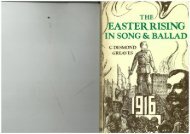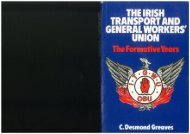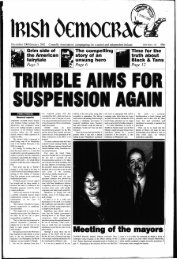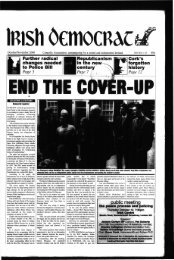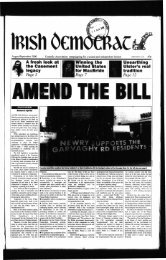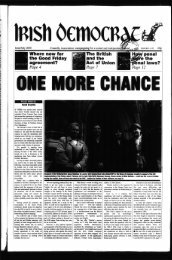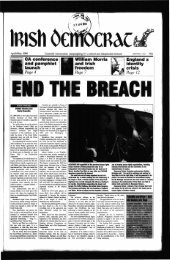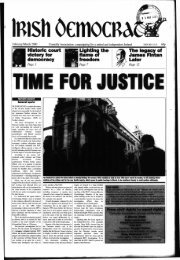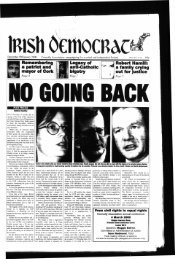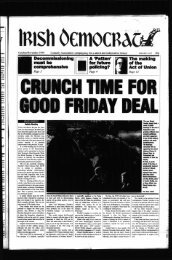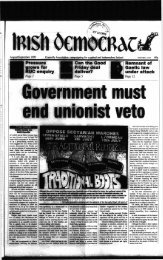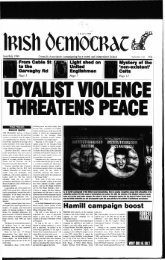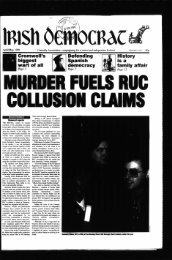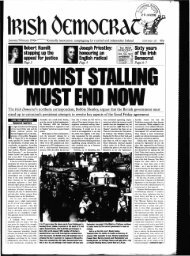You also want an ePaper? Increase the reach of your titles
YUMPU automatically turns print PDFs into web optimized ePapers that Google loves.
Towards a politics of<br />
reconciliation in Ireland<br />
How the <strong>Irish</strong> left has absorbed<br />
Connolly's ideas.<br />
Human-sized politics: a tribute to<br />
economist Leopoold Kohr<br />
<strong>December</strong> I <strong>January</strong> <strong>1995</strong> • Price 40p<br />
Connolly Asaqciation: campaigning for a united and independent Ireland<br />
Helen Bennett<br />
JI ohn Major's announcement<br />
of<br />
the decision to<br />
I open talks with<br />
Sinn Fein three<br />
months to the day after<br />
the IRA cessation of<br />
violence is very welcome.<br />
But it has been<br />
seen as a reaction to the<br />
angry dismay in the<br />
United States over the<br />
British government's exclusion<br />
of Sinn Fein from<br />
the Belfast investment<br />
forum.<br />
Major's policy of just<br />
keeping ahead of the<br />
posse in the peace<br />
process and, at the same<br />
time, keeping in with his<br />
Unionist MP allies in Parliament<br />
cannot go on<br />
indefinitely.<br />
The idea of a conference<br />
to encourage<br />
investment in the Six<br />
Counties was initiated by<br />
President Clinton. But<br />
John Major jumped in<br />
before the Americans<br />
with a hastily organised<br />
forum which left out the<br />
cross-border element,<br />
thereby soothing the<br />
Unionists.<br />
When the 50-strong<br />
US delegation heard that<br />
Sinn Fein was to be excluded<br />
from the<br />
conference by the British<br />
organisers, the reaction<br />
was stormy with many<br />
key investors thre tening<br />
to pull out.<br />
The British government<br />
then moved the<br />
peace process forward<br />
overnight, inviting Sinn<br />
Fein to exploratory talks<br />
before Christmas, and<br />
saying it would invite individual<br />
Sinn Fein<br />
councillors to the<br />
economic forum.<br />
The whole affair illustrates<br />
the reluctance<br />
of the British to treat Sinn<br />
Fein with parity of estime,<br />
and exposes its real<br />
desire to isolate the most<br />
uncompro mi^l n g<br />
republican voices.<br />
But Sinn Fein members<br />
are not the only<br />
republicans in Ireland.<br />
Other; less brave,
HEADLINES<br />
H E A f f i J N E S<br />
C o m m e n t<br />
Solidarity<br />
Thirty years ago the late Desmond<br />
Greaves, former editor of the <strong>Irish</strong><br />
<strong>Democrat</strong>, launched the concept of a<br />
three-pronged attack on Unionism as the<br />
way to achieve a united Ireland peaceably.<br />
Prong one was a movement for democracy in<br />
the Six Counties to break up the Unionist<br />
monolith. Prong two, a movement in the 26 counties<br />
to strengthen everything national there and<br />
make the Dublin government speak for<br />
nationalist Ireland. Prong three was a solidarity<br />
movement in Britain to win public opinion to a<br />
pro-<strong>Irish</strong> position in the country where British<br />
policy is made. That concept seems as valid now<br />
as it was then.<br />
The Hume-Adams agreement inaugurated<br />
the peace process. Unity on essentials between<br />
the two elements of Six County nationalism<br />
remains crucial to its future progressive development.<br />
Sinn Fein and the SDLP need to sing from<br />
the one hymn sheet, at least so far as concerns<br />
the key demands that will improve the security<br />
and political position of the 42 per cent Catholic<br />
minorty. If Northern nationalism speaks with<br />
one voice, public opinion in the 26 counties is<br />
bound to insist that Dublin supports whatever it<br />
wants.<br />
All this makes solidarity work in Britain absolutely<br />
vital in the period ahead. The reason is<br />
that only British public opinion is potentially<br />
strong enough to change British government<br />
policy. It is far more important than what happens<br />
in America, valuable though support from<br />
there naturally is. Yet since the 1920s <strong>Irish</strong><br />
nationalism in Ireland has neglected this key<br />
fact In Parnell's time the <strong>Irish</strong> in Britain helped<br />
make the <strong>Irish</strong> question a major issue in British<br />
politics. That needs to happen again in the<br />
1990s. Sinn Fein, the SDLP and the Dublin<br />
government have now got an objective interest<br />
in winning the support of British public opinion<br />
for their common demands. Their joint encouragement<br />
from Ireland could galvanise the<br />
solidarity movement in Britain.<br />
The huge fund of good will among the<br />
British friends of Ireland needs now to be<br />
turned into an organised force to press the<br />
British government for progressive <strong>Irish</strong> policy,<br />
right up to Britain becoming "positive persuaders"<br />
for <strong>Irish</strong> reunificaion. Such a step<br />
would politically transform the situation, cutting<br />
the ground from under Unionism completely.<br />
It would conform to the fact that the mass of<br />
the British people have no objective interest in<br />
staying on in the Six Counties. In fact they<br />
would be much better off without them. The<br />
Connolly Association, the Troops Out Movement,<br />
the Labour Committee on Ireland, the<br />
Labour <strong>Irish</strong> Society, the churches and trade<br />
unions, the <strong>Irish</strong> county associations and GAA<br />
bodies, the <strong>Irish</strong> Post and the other <strong>Irish</strong> papers<br />
in this country need now to get together to press<br />
the Major government, as well as the Labour<br />
and Liberal parties, to push forward the cause of<br />
peace with justice in Ireland. They also need to<br />
criticise British government foot-dragging. They<br />
need to raise the question, too: if there is to be a<br />
referendumin the Six Counties, why should not<br />
the British people have a referendum in Britain<br />
on union with the Six Counties?<br />
Feichreanach<br />
luish Oeracxmc<br />
MONTHLY NEWSPAPER OF THE<br />
CONNOLLY ASSOCIATION<br />
Founded 1939 Vol 49, no 2<br />
EDITORIAL BOARD: Helen Bennett, (editor) Gerard<br />
Curran, Conor Foley, Jonathan Hardy, Mutin Moriarty,<br />
Peter Mulligan<br />
TYPESET AND DESIGNED: Connolly Publications<br />
PUBLISHED BY: Connolly Publications }AA, 244 Gray's<br />
Inn Road, London WC1X 8JR. Tel: 071-ft3T#£2<br />
PRINTED BY: Ripley Printers (TU) Ltd^ottingham<br />
Road, Ripley, Derbyshire. Tel: 0773-7316*1<br />
1939-1980 and 1981-90 now available on microfilm<br />
Falling behind the Tories<br />
LABOUR POLICY<br />
Alex Reid<br />
The fears expressed in the<br />
last edition of this paper<br />
regarding the Labour<br />
Party's commitment to its<br />
long-held policy of unity by<br />
consent appear to have been<br />
realised.<br />
Firstly, the more positive<br />
aspects for <strong>Irish</strong> unity within<br />
the official party policy have<br />
been sidelined as the party has<br />
moved increasingly toward a<br />
bipartisan position.<br />
Secondly, the appointment<br />
of Mo Mowlam, the MP for<br />
Redcar, as the Labour Party's<br />
Northern Ireland spokesperson<br />
has raised concern among<br />
many activists and from the<br />
wider <strong>Irish</strong> community in<br />
Britain.<br />
Initially it seemed a victory<br />
had been won regarding the<br />
campaign to retain the policy<br />
of "unity by consent." Both<br />
resolutions from the floor of<br />
conference and the National<br />
Executive Committee statement<br />
itself reaffirmed the<br />
policy adopted in 1981. However,<br />
since the conference in<br />
early October, official statements<br />
have been emphasising<br />
the more negative aspect of<br />
their policy. That is, they continue<br />
to heap praise on John<br />
Major and his government for<br />
their role in die developing<br />
peace process. And further, no<br />
pressure has been emanating<br />
from the Labour Party on the<br />
need for the government to<br />
take on the role of "persuaders."<br />
On all the major issues<br />
- the ceasefires, the release<br />
of prisoners, all-party talks,<br />
their continued support for the<br />
principles included in the<br />
Downing Street Declaration<br />
and the whole demilitarisation<br />
process - official Labour Party<br />
statements have been almost<br />
inistinguishable from those of<br />
the Tory government.<br />
Concern has also been<br />
raised on the appointment of a<br />
new party spokesperson on<br />
Northern Ireland. While Kevin<br />
McNamara was never successful<br />
in gaining election to the<br />
shadow cabinet, he was, nonetheless,<br />
one of Labour's most<br />
effective propagandists. He<br />
tirelessly advocated Labour's<br />
official policy throughout his<br />
time in die post and, as he is an<br />
<strong>Irish</strong>man, Labour voters from<br />
an <strong>Irish</strong> background could<br />
identify with him. His high<br />
profile within the <strong>Irish</strong> press in<br />
Britian is thought by many to<br />
have significantly increased<br />
votes for Labour among the<br />
<strong>Irish</strong> in Britain.<br />
Mo Mowlam has been playing<br />
a very low key role since<br />
moving into her new post. Initial<br />
reports suggest she is still<br />
finding her way around die job<br />
and she went as far as responding<br />
to one reporter's question<br />
by replying: "I don't know<br />
enough to answer that yet."<br />
(<strong>Irish</strong> Post 12.11.94) It wasn't<br />
reported what the question<br />
was.<br />
Some Labour Party activists<br />
and at least one MP, Ken<br />
Livingstone, have suggested<br />
that both the watering down of<br />
party policy and the sacking of<br />
McNamara are die result behind-the-scenes<br />
manouevering<br />
by the infamous "spin<br />
doctor" Peter Mandelson. He<br />
is thought to have briefed<br />
reporters that the party was<br />
going to make a decided shift<br />
in policy and also that Mc-<br />
Namara was going to lose his<br />
job because die leadership was<br />
Human rights abuses ignored<br />
UNIONISTS<br />
Enda Finlay<br />
Two leading Ulster<br />
Unionist MPs Roy Beggs<br />
and Cecil Walker were<br />
members of a trade delegation<br />
to Indonesia, as guests of an<br />
interparliamentary group<br />
called the Anglo Indonesian<br />
Friendship Society. The other<br />
four delegates were Tory MPs.<br />
Human rights activists have<br />
been outraged at the comments<br />
of the delegation. According to<br />
Patrick Nicholls MP who led<br />
the group, the reason for die<br />
Put on the<br />
pressure in <strong>1995</strong><br />
THE Connolly Association<br />
will be organising a lobby of parliament<br />
early in the new year to<br />
urge the genuine movement<br />
towards a real political settlement.<br />
Members are urged to organise<br />
a petition in their areas to<br />
bring to die lobby and to write to<br />
their MPs. For example, the following<br />
petition has been drawn<br />
up by members in the Midlands:<br />
"We, die undersigned, urge<br />
the British government to get<br />
contructive talks going with<br />
Sinn Fein, the SDLP and other<br />
political groups in Northern<br />
Ireland. The time is ripe to end<br />
the Prevention of Terrorism Act<br />
and the Emergency legislation<br />
associated with the 25 years of<br />
conflict. We feel the government<br />
could be doing a great deal more<br />
to encourage conciliation."<br />
visit was prompted by the<br />
British people's concern about<br />
human rights abuses in east<br />
Timor.<br />
The delegation concluded<br />
with a series of bland statements<br />
praising the armed forces<br />
officers who are engaged in<br />
educational and social activities<br />
and Nicholls also stated<br />
that "following the Portuguese<br />
decolonisation (sic) it was<br />
natural if the East Timorese<br />
people wanted to join with<br />
their brothers in other parts of<br />
Indonesia since geographically<br />
East Timor is part of Indonesia".<br />
The delegation (which was<br />
paid for by the Indonesian<br />
military government) have<br />
manifestly failed to meaningfully<br />
address the human rights<br />
abuses that are and have been<br />
perpetrated by the Suharto<br />
regime. For the first time ever<br />
Amnesty International have<br />
declared a leading government<br />
criminal and have confirmed<br />
the slaughter of 200,000 East<br />
Timor people under Indonesian<br />
occupation. There are<br />
also ten UN resolutions condemning<br />
its invasion of East<br />
Timor.<br />
As Stephen McCloskey of<br />
the East Timor Solidarity Campaign<br />
(NI) has said "It seems<br />
strange that these same MPs<br />
can condemn human rights<br />
Join the Connolly Association!<br />
The Connolly Association is the premier <strong>Irish</strong><br />
organisation in Britain campaigning for civil liberties and<br />
fair employment in the Six Counties and for a repeal of the<br />
British claim to sovereignty over Northern Ireland.<br />
Membership costs a mere £10 a year (£12 for couples, £6<br />
unwaged couples and £5 for Individual students,<br />
unemployed and pensioners) and includes a free<br />
subscription to the <strong>Irish</strong> <strong>Democrat</strong><br />
NAME<br />
ADDRESS<br />
I enclose a donation of £.<br />
Postcode<br />
. towards the campaign<br />
Return this form with your cheque payable to Connolly<br />
Association to: 244/46 Gray's Inn Road, London WC1<br />
unhappy with his stance<br />
which "alienated" unionists.<br />
This may be overstating the<br />
power of one individual MP,<br />
particularly as this one has<br />
never been elected on to the<br />
NEC or indeed the shadow<br />
cabinet. Or, on the other hand,<br />
it may be a reflection of die<br />
weakness of a party which allows<br />
an ordinary MP like Mandelson<br />
to dominate its policy<br />
promotion machinery.<br />
Whatever the role of Peter<br />
Mandelson in this affair, grave<br />
disquiet remains over<br />
Labour's commitment to unity<br />
by consent and more immediately<br />
to the <strong>Irish</strong> peace process<br />
itself.<br />
A more vocal opposition is<br />
desperately needed to increase<br />
the pressure on the British<br />
government to effectively<br />
respond to die developments<br />
taking place.<br />
Up until now, the government<br />
has been dragging its feet<br />
while die Labour Party has fallen<br />
behind their every step. It is<br />
maybe time for activists to put<br />
some pressure on opposition<br />
MPs to take some initiatives of<br />
their own.<br />
abuses in Northern Ireland<br />
while apparently tolerating<br />
much wider human rights<br />
abuses in East Timor".<br />
It seems that the Ulster<br />
Unionist MPs were caught<br />
showing their true colours<br />
away from the media spotlight<br />
that is focused on the Six Counties,<br />
and questions their commitment<br />
to democracy and<br />
upholding human rights.<br />
Further information;<br />
British Coalition for East<br />
Timor (BCET), PO Box 2349,<br />
London El 3HX.<br />
East Timor Solidarity Campaign<br />
(ETSCNI), 4 Lower Crescent,<br />
Belfast, BT71NR.<br />
AT THE first meeting of the<br />
Connolly Association's new<br />
executive, Peter Mulligan,<br />
(above) president for many<br />
years, stood down. The new<br />
president is David Granville.<br />
Other officers elected were<br />
Enda Finlay as general<br />
secretary, Alex Reid as assistant<br />
general secretary, and<br />
Jonathan Hardy as treasurer.<br />
Connolly Association's vital role<br />
CONFERENCE<br />
David Granville<br />
Recent developments in<br />
the <strong>Irish</strong> peace process<br />
have opened up unprecedented<br />
opportunities for<br />
developing solidarity activity<br />
in Britain in support of<br />
nationalist demands, delegates<br />
concluded at the Connolly<br />
Association's annual conference,<br />
held in Marchmont<br />
Community Centre in London<br />
at the end of October.<br />
In his opening address,<br />
Connolly Association President<br />
Peter Mulligan reminded<br />
delegates of the "fire and<br />
political conviction" of those<br />
who had founded the Association<br />
back in 1939. An unshakeable<br />
belief that imperialism<br />
could have no place in a<br />
modern world and that<br />
Ireland's freedom would free<br />
the British people to "free<br />
themselves" was central to.<br />
their outlook, he said.<br />
"That fire and political conviction<br />
had motivated members<br />
to campaign for a free and<br />
united Ireland for the last five<br />
decades."<br />
The Association needed to<br />
maintain die political initiative<br />
to move the process forward<br />
still further. "We have a vital<br />
part to play in moulding the<br />
public attitudes that will undoubtedly<br />
influence the road<br />
that the British government<br />
may take.<br />
Taking up the point, Alex<br />
Reid stressed the need to build<br />
alliances with a wide range of<br />
organisations "to advance our<br />
shared objective of British<br />
withdrawal and <strong>Irish</strong> unity."<br />
A former national organiser<br />
of the Association and<br />
<strong>Irish</strong> <strong>Democrat</strong> correspondent<br />
over the past thirty years, Anthony<br />
Coughlan stressed that,<br />
"The current situation was a<br />
complete vindication of the<br />
Connolly Association's policy<br />
and activities over tile last 25<br />
years."<br />
The value of the<br />
Appeal <strong>1994</strong><br />
Greeting? and many<br />
thanks to all "our supporters<br />
who have sent in sums, however<br />
small, throughout a difficult<br />
year to die Connolly<br />
Association and the <strong>Irish</strong><br />
<strong>Democrat</strong>.<br />
We look forward to your<br />
continuing support over the<br />
next crucial year.<br />
Donations received for<br />
the period 15/9/94 -<br />
17/11/94:<br />
PE Dwyer £7.50, UNISON<br />
(Leicester) £25, D Mc-<br />
Loughlin £10, K Haldane £5,<br />
G Findlay £5, F Jennings £20,<br />
J Hearne £1, J Doyle £2, C<br />
Lewis £3, Anon £10.66, R<br />
Doyle £5, B Wilkinson £2,<br />
Tessa K & Mark L £4.40, J<br />
Clarke £1, C OTferlihy £20, J<br />
Farrel £5, K Doody £4,<br />
Bankers Orders £353.18<br />
TOTAL £483.74<br />
Association's strategy of winning<br />
allies, particularly within<br />
the British labour movement,<br />
for civil liberties, democracy,<br />
and a united Ireland had<br />
gained wide recognition, he<br />
said.<br />
v The transformation of the<br />
peace process meant that there<br />
was a real possibility of mass<br />
solidarity activity of a qualitatively<br />
new kind, he said.<br />
i Identifying the next big<br />
political challenge as the political<br />
battle over the character of<br />
any in^im settlement, he argued<br />
that, "Whatever interim<br />
arrangements are eventually<br />
agreed, it is clear that Unionists<br />
will press for any executive<br />
body to have a minimum of<br />
powers. Nationalists and their<br />
supporters must make the case<br />
for the exact opposite."<br />
In addition to welcoming<br />
both the IRA and Loyalist<br />
ceasefires, delegates agreed<br />
that a campaign calling on the<br />
British government to declare<br />
its interest in <strong>Irish</strong> unity was a<br />
major priority.<br />
"This would put us in tandem<br />
with nationalist Ireland<br />
and its demand for the British<br />
government to recognise the<br />
value of a united and<br />
sovereign Ireland," said Glasgow<br />
delegate Willie Wallis<br />
"If such a declaration was<br />
issued, it would send a clear<br />
signal to <strong>Irish</strong> Protestants and<br />
their representatives that the<br />
union between 'Great Britain'<br />
and 'Northern Ireland' was<br />
neither desirable nor ine<br />
vi table.<br />
It would also encourage the<br />
British Government to work<br />
constructively with Dublin, sb<br />
as to develop the political, social<br />
and economic strategies<br />
necessary to win the consent of<br />
the six county Protestants to<br />
the ending of partition and<br />
British rule in Ireland, he suggested<br />
Conference also agreed to:<br />
intensify the campaign<br />
against die PTA; continue to<br />
highlight Section 75 of the<br />
Government of Ireland Act as<br />
an obstacle to a just and lasting<br />
settlement; give support to the<br />
development of progressive<br />
The Connolly Association invites you to<br />
The Annual Mountjoy<br />
Martyrs Commemoration<br />
Christmas Evening %<br />
Saturday 10 <strong>December</strong> <strong>1994</strong><br />
7.30 fill late<br />
* Christmas buffet and drinks * Prize raffle<br />
* Special guest speakers * Entertainments<br />
at Our Lady of Hal Centre, Arlington<br />
Road, Camden London<br />
Tickets £12 (waged) £6 (unwaged)<br />
economic policies in Ireland in<br />
tandem with the withdrawal<br />
process; support the forum for<br />
national peace and reconciliation;<br />
highlight the plight of<br />
<strong>Irish</strong> political prisoners; oppose<br />
the Criminal Justice Bill.<br />
Particular praise was<br />
forthcoming for all the volunteers<br />
who had worked hard to<br />
re-establish the Four Provinces<br />
Bookshop in 244 Gray's Inn<br />
Road following a decision by<br />
Camden Council to sell the<br />
original bookshop premises.<br />
Delegates also endorsed a motion<br />
supporting die principal<br />
of relocating the bookshop to<br />
the new Hammersmith and<br />
Fulham <strong>Irish</strong> Cultural and<br />
Community Centre.<br />
Incoming Executive Council:<br />
Helen Bennett, Stella Bond,<br />
Gerrard Curran, Jim Duggan,<br />
Enda Finlay, David Granville,<br />
Jonathan Hardy, Eleanor<br />
Hyland, Barney Morgan, Peter<br />
Mulligan, Pat O'Donohoe,<br />
Sean OHoideain, Alex Reid,<br />
and Willie Wallis.<br />
Book the date:<br />
<strong>January</strong> 13th<br />
<strong>1995</strong><br />
<strong>Irish</strong><br />
<strong>Democrat</strong><br />
Benefit<br />
Concert -<br />
featuring:<br />
Kelly's Heroes<br />
and support<br />
Spread Eagle<br />
Pub, Charles<br />
Street, Leicester<br />
Ticket* £5 from 0604<br />
715793<br />
WORLD<br />
BY<br />
COMMENT<br />
POLITICUS<br />
A fundamental<br />
conflict<br />
Tension between transnational capital and the<br />
nation state is the fundamental political conflict<br />
of our time. This is the form in which the<br />
struggle between labour and capital that has<br />
been going on since the beginning of industrialism,<br />
works itself out politically in the late 20th<br />
and 21st centuries.<br />
The prime interest of capital is to make maximum<br />
private profit out of employing labour. In turn<br />
labour's prime interest is to retain for itself as much of<br />
the value of what it produces as it can. Capital, big<br />
business has always tried to prevent labour organising<br />
to defend its interests. In the early days it outlawed<br />
trade unionism directly. When that failed, it sought to<br />
co-opt labour's leaders to induce them to identify with<br />
capital and help run society in capitalism's interest.<br />
Labour in turn has sought to use the state to impose social<br />
controls on private capital, to restrain the furies of<br />
private interest by laws expressing collective values<br />
over private, individual ones and embodying some notion<br />
of the common good. Thus labour struggles won<br />
laws outlawing children's and women's work in<br />
mines in the 19th century, limiting hours of work and<br />
introducing the beginning of modern health services,<br />
social security and education.<br />
In the 20th century further labour political advance<br />
gave us the welfare state. In most developed countries<br />
the welfarestate and social services now cost a quarter<br />
of the national income and three quarters of<br />
governmental spending. As well, in the quarter century<br />
1945-1970 following World War II, the major<br />
capitalist governments followed Keynesian-type<br />
policies to achieve full employment. This was partly<br />
to maintain business profits, partly in response to<br />
strong pressure from political Labour. Another motive<br />
was fear of communism, which made capitalist governments<br />
in western Europe conciliatory to labour. This .<br />
was an important political reason sustaining the<br />
western welfare states.<br />
All that was in the period when big capitalism was<br />
mostly nationally based. Nowadays, big capital is increasingly<br />
transnational. About 300 companies, mostly<br />
headquartered in the main capitalist countries,<br />
produce half the manufactures of the entire world.<br />
Bowing to business pressure over the past 20 years, national<br />
governments have lifted all controls on the<br />
movement of capital. Deregulation rules, introducing<br />
new instability into international high finance. Computers<br />
now move trillions of pounds or dollars in an<br />
instant to the other side of the world. This is finance<br />
capital frantically searching for the highest interest<br />
rates, to maximize the returns to its private owners, although<br />
low interest rates are needed everywhere to encourage<br />
domestic investment and real production.<br />
Free movement of capital makes impossible national<br />
economic planning or the pursuit of full employment<br />
policies. It subverts the basis of established<br />
welfare states. If social services are good, needing<br />
high taxes to financethem, private capital threatens to<br />
move abroad. If standards are high in western Europe,<br />
big business decamps to eastern Europe or the Third<br />
World, where labour costs are low and social and environmental<br />
controls minimal.<br />
The only agency that can control private capital is<br />
the nation state - either individual states on their Own<br />
or in cooperation with others if necessary. That is why<br />
big capital and high finance nowadays are doing<br />
everything they can to subvert the nation state, as well<br />
as welfare states that are all nationally based. That is<br />
why a bask raleof the EEC is uncontrolled movement<br />
of capital It is why the Maastricht Treaty makes illegal<br />
any controls on capital into or out of EC territory.<br />
It is also the reasonwhy democrats, not to speak of<br />
socialists or labour people, who desire social controls<br />
on capital in the interests of die community as a<br />
whole, have to put the defence of the nation state at<br />
the centre of their politics.<br />
More nowadays than ever before, national<br />
democracy and political independence are the means<br />
of obtaining all other political and economic values. It<br />
is why here, fatBritain, the defence of sovereignty and<br />
opposition tothe EEC has to be central for anyone<br />
with pretensions to having a rationaland constructive<br />
political point of view.<br />
IRISH DEMOCRAT <strong>December</strong> / <strong>January</strong> <strong>1995</strong> page 2<br />
IRISH DEMOCRAT D • c • m b • r / <strong>January</strong> <strong>1995</strong> paga 3
This Christmas and New<br />
Year we ask you to<br />
remember:<br />
<strong>Irish</strong> prisoners in<br />
English jails<br />
WE DO not condone acts of terrorism. However, we do<br />
consider the <strong>Irish</strong> prisoners to be political victims of<br />
Britain's presence in Ireland and its current inability to<br />
negotiate a full and final settlement of the <strong>Irish</strong> question<br />
with all those involved.<br />
H.M. Prison Full Sutton, Full Sutton, York, York,<br />
Y04 IPS<br />
Butler<br />
McComb<br />
Quigley<br />
Wood<br />
Kelly<br />
Doherty<br />
O'Brien<br />
O'Connell<br />
Eddie 338637<br />
Damien MT2484<br />
Thomas B69204<br />
Vincent EN1049<br />
Patrick FN1194<br />
Hugh .338636<br />
Michael BR3782<br />
Joe 338635<br />
Count 8<br />
H.M. Prison Frankland, Finchdale Avenue, Brasside,<br />
Durham DH 1 5YD<br />
Norney<br />
Nordone<br />
Gibson<br />
McKenney<br />
Donnelly<br />
Duggan<br />
McGlynn<br />
Paul 863532<br />
Stephen 758663<br />
Noel 879225<br />
Joe L46486<br />
Vincent 274064<br />
Harry 338638<br />
Pat EN 1946<br />
Count 7<br />
H.M. Prison Parkhurst, Newport, Isle of Wight,<br />
P030 5NX<br />
Hayes Patrick EN1978<br />
Canning James BR3165<br />
Mullan Nicholas MR0639<br />
Kinsella Sean 758661<br />
Count 4<br />
H.M. Prison Whitemoor, Longhill Road, March<br />
Cambs, PE15 0DR<br />
MaGee Paul BR3783<br />
McCotter Liam LB83693<br />
Kinsella Dennis EN1944<br />
Quinn Liam L49930<br />
Sherry Peter B75880<br />
Taylor Jan Taylor EN1977<br />
O'Dwyer Liam MT2485<br />
Dowd Brendan 758662<br />
count total - 27<br />
Count 8<br />
Always use the prison number in any correspondence<br />
ISSUED BY-<br />
Northampton Connolly Association, 5 Woodland<br />
Avenue, Abington, Northampton NN3 2BY<br />
Repatriation legislation<br />
THE IRISH government has given the go-ahead for the<br />
drafting of legislation to permit the repatriation of <strong>Irish</strong><br />
prisoners abroad, "as a matter of priority," according<br />
to a statement from Albert Reynolds just before he<br />
ceased to be Taoiseach.<br />
The government signed the European Convention<br />
on the transfer of sentenced prisoners in 1986 but never<br />
passed the necessary legislation to permit its enactment.<br />
This belated move is now seen as a reaction to the<br />
IRA's cessation of violence.<br />
The Committee for the Repatriation of <strong>Irish</strong><br />
Prisoners has said that 80 per cent of the 1,200 <strong>Irish</strong>born<br />
prisoners abroad are in Britain. About 50 want to<br />
be repatriated in the first year after the legislation was<br />
passed, says the CRIP. Most of the 27 republican<br />
BEHIND THE HEADLINES<br />
Towards a<br />
politics of<br />
reconciliation<br />
DAVID<br />
GRANVILLE<br />
talks to the<br />
co-ordinator of the<br />
Belfast-based<br />
Campaign for<br />
Democracy<br />
KEVIN MC<br />
CORRY about the<br />
way forward in the<br />
Six Counties<br />
Despite the recent political<br />
crisis in Dublin, thp killing<br />
of a postal worker in<br />
Newry by IRA members, and<br />
the British government's seemingly<br />
determined reluctance to<br />
embrace the <strong>Irish</strong> peace initiative,<br />
a climate of popular optimism<br />
is flourishing in the<br />
North.<br />
A direct result of the<br />
Republican and Loyalist<br />
ceasefires, the new atmosphere<br />
has already paved the way for<br />
a series of community initiatives<br />
on difficult and sensitive<br />
issues such as policing,<br />
economic and social regeneration<br />
and community identity.<br />
"All of these exercises have<br />
revealed a spirit of accomodation<br />
and flexibility light years<br />
ahead of the media representation<br />
of the North," explains<br />
Kevin McCorry.<br />
But, while agreeing that all<br />
this augers well for the future,<br />
he feels that the new conditions<br />
still lack a coherent<br />
politics which can point the<br />
way ahead beyond these local<br />
and piecemeal initiatives,<br />
towards a broader vision. A<br />
vision, he insists, which must<br />
take account of the differences<br />
in aspirations of the two<br />
Northern communities while<br />
seeking to transcend these<br />
obstacles through the development<br />
of a new and more inclusive<br />
identity.<br />
"For just over 200 years, the<br />
core idea of <strong>Irish</strong> democracy<br />
has been the recognition that<br />
progress towards popular<br />
sovereignty and a democratic<br />
society is dependent on the<br />
ability of the <strong>Irish</strong> people to<br />
transcend the religious and<br />
cultural differences which<br />
exist in the country."<br />
The objectives of Wolf<br />
Tone and the United <strong>Irish</strong>menremain<br />
as valid today as in<br />
1791. "To unite the whole<br />
people of Ireland, to abolish<br />
the memory of all past dissensions,<br />
and to substitute the<br />
common name of <strong>Irish</strong> man in<br />
place of the denomination of<br />
Protestant, Catholic and Dissenter"<br />
was the basis for building<br />
a sovereign state.<br />
But, it's an idea which has<br />
found precious little breathing<br />
space in the history of the Six<br />
County statelet.<br />
It's the background of<br />
political oppression, exclusion<br />
and discrimination makes it<br />
difficult to reconcile the idea of<br />
unionism - of whatever variety<br />
- with the concepts of<br />
pluralism, inclusiveness and<br />
normal democracy.<br />
So, while welcoming the<br />
stated desire of new "working<br />
class" unionist parties like the<br />
Progressive Unionist Party<br />
and the Ulster <strong>Democrat</strong>ic<br />
Party, to move unionists<br />
towards in this direction, he<br />
remains sceptical about their<br />
preparedness to make a total<br />
break with the past.<br />
Northern nationalism also<br />
comes in for strong criticism<br />
for what he describes as its<br />
"historically narrow and backward<br />
outlook". "Its politics<br />
was middle class controlled<br />
with a heavy church input. It<br />
was populist and manipulative<br />
and, most importantly, it<br />
had nothing to say to the<br />
Protestants because it was essentially<br />
about getting a cut of<br />
the cake for Catholics within<br />
the Northern polity."<br />
He's equally scathing of attempts<br />
by some traditional<br />
nationalists, such as John<br />
Hume, who argue that the nation<br />
state is an outdated concept<br />
in the modern European<br />
context, expressing a desire to<br />
replace it with some, as yet, ill<br />
defined notion of European<br />
identity.<br />
"The new nationalism is as<br />
unrelated to the real world as<br />
the old nationalism was. It is<br />
incapable of delivering the<br />
political goodies because it's<br />
jumping the fundamental<br />
question facing us here and<br />
now of how to build a political<br />
entity here in Ireland," stresses<br />
McCorry.<br />
All of this takes him back to<br />
the quest for popular<br />
sovereignty and democratic<br />
rights by bringing people<br />
together, irrespective of their<br />
background as "Catholic,<br />
Protestant or Dissenter".<br />
It's in working towards this<br />
objective which requires the<br />
construction of what he<br />
* Will the Orangemen be part of an inclusive democracy ?<br />
describes as a "Politics of<br />
Reconciliation."<br />
To be successful, he argues,<br />
this will entail setting out all<br />
the obstacles to community<br />
and national reconciliation on<br />
the agenda for removal - including<br />
partition - and working<br />
out a practical programme<br />
for achieving this objective.<br />
"This will include questions<br />
such as demilitarisation<br />
and discrimination - a fact of<br />
life for Catholics, which 20<br />
years of direct rule has failed to<br />
address. There must be an affirmative<br />
programme, a<br />
demand even, that the British<br />
government makes a reality of<br />
its commitment to the notion of<br />
'parity of esteem'," he insists.<br />
A recent trade union initiative<br />
from MSF has come forward<br />
with plans for a social<br />
and economic regeneration<br />
fund. The union has calculated<br />
that the "peace dividend"<br />
could amount to as much as<br />
one billion pounds, including<br />
funds from Europe and the US,<br />
which could then be used for<br />
social and economic initiatives<br />
such as developing infrastructure<br />
on an all-Ireland basis, research<br />
into the development of<br />
sustainable industries, or for<br />
short investment in areas such<br />
as tourism.<br />
All of this would depend<br />
on a strict auditing regime to<br />
ensure that the British government<br />
did not siphon off<br />
savings back to Treasury coffers.<br />
He outlines the basic principals<br />
which should inform a<br />
politics of reconciliation in<br />
Ireland as follows:<br />
Measures should be judged<br />
against whether they:<br />
lessen external political,<br />
cultural and socio-economic<br />
interference in Ireland;<br />
» assist in developing and<br />
strengthening popular organisations<br />
- encouraging<br />
them to seek redress of their<br />
grievances through their own<br />
efforts;<br />
•develop all-Ireland<br />
linkages at a grassroots level.<br />
• advance the maximum<br />
democratisation of political,<br />
social and economic life in the<br />
interests of the broadest sections<br />
of the population.<br />
Of course, the objectives of<br />
a politics of reconciliation will<br />
remain largely aspirational<br />
until a new situation is allowed<br />
to develop on the ground following<br />
the withdrawal of<br />
British troops and the repeal or<br />
suspension of emergency<br />
legislation.<br />
The Campaign for<br />
Democracy is currently involved<br />
in an initiative to<br />
develop an all - Ireland network<br />
of political and campaigning<br />
organisations, trade<br />
unionists and influential individuals<br />
which could have an<br />
important role in assisting the<br />
development of the mass<br />
politics based on the importance<br />
of community and national<br />
reconciliation.<br />
"The core question is about<br />
developing a framework<br />
within which the Protestant<br />
community can willingly play<br />
a creative part in building ?<br />
sovereign, independent nation<br />
state, untainted by any whiff of<br />
sectarian hegemony."<br />
"The main objective of<br />
British politicians has been to<br />
marginalise and isolate<br />
Republicans, to take the steam<br />
out of any mass campaigns, to<br />
isolate the whole situation in<br />
the North of Ireland from<br />
progressive and Labour forces<br />
in both Ireland and Britain.<br />
"It is patently obvious that<br />
democrats should be doing<br />
everything that is directly opposite<br />
- to seek to build mass<br />
organisations, to strengthen<br />
and consolidate them, to<br />
engage in mass struggle, and<br />
to seek the maximum linkages<br />
with people in Ireland and<br />
Britain."<br />
* The Campaign for Democracy<br />
was established in 1988 to<br />
promote a greater democratisation<br />
of <strong>Irish</strong> society, North and<br />
South. Its members come mainly<br />
from civil rights, civil liberties,<br />
labour and trade union backgrounds.<br />
Consent, coercion<br />
and democracy.<br />
A Belfast<br />
correspondent<br />
dissects the<br />
question of<br />
democracy and<br />
shows that it has<br />
nothing to do with<br />
the Unionist veto<br />
Ever since the ceasefire and<br />
the appearence of<br />
Republican spokespersons<br />
on TV, questions are often<br />
put to them in such a way as to<br />
make them appear to be rejecting<br />
democracy. Typically it is<br />
asked 'Do you accept the<br />
democratic wish of the people<br />
of Northern Ireland to stay in<br />
the United Kingdom?', or<br />
some formulation like that.<br />
The usual response is to<br />
'retaliate' with a statement<br />
along the lines that 'There<br />
should be no veto by any section<br />
of the <strong>Irish</strong> people...' So<br />
in one corner we have<br />
'democratic majority' and in<br />
the other 'Unionist veto' to<br />
refer to the same thing. At best<br />
we have a sort of stand off.<br />
But at worst this sometimes<br />
gives the impression of<br />
Republicans 'retreating' before<br />
the challenge thrown down by<br />
the original question, because<br />
they do not appear to give a<br />
direct answer to it. It is far better<br />
to go on the attack, and<br />
criticise the vqry idea within<br />
the original question - the notion<br />
that there is 'democracy'<br />
in the Six Counties.<br />
So first of all, the fallacy<br />
within the question must be<br />
pointed out.<br />
Second, the real question<br />
must be put. Before one talks<br />
about 'democratic decisions'<br />
within the Six County statelet,<br />
the more fundamental question<br />
must be asked first: 'Does<br />
democracy even exist within<br />
Obituaries<br />
Alt (Pat) Ward 1914-<strong>1994</strong><br />
ALF or Pat as his mates knew<br />
him was born in Belfast. He<br />
served in the second World<br />
War and in India. After demob<br />
he settled in Oxford where he<br />
worked for the Oxford Bus<br />
Company for over 30 years.<br />
Most of this time he was a shop<br />
steward and for the last 12<br />
years he served as union<br />
secretary.<br />
Alf joined the Connolly Association<br />
in 1959 and immediately<br />
set up an active branch in<br />
Oxford. He was the Chairman<br />
the Six Counties? For surely<br />
democracy must be established<br />
first before 'democratic<br />
decisions' can be arrived at.<br />
Third, it could be pointed<br />
out that the problem is not that<br />
Republicans do not 'accept' the<br />
'democracy of the six<br />
counties'. The nationalist<br />
people reject the Six County<br />
statelet on the grounds that<br />
democracy has never been extended<br />
to them within it.<br />
This opens up the argument<br />
to the real nature of the problem<br />
- the miserable history of<br />
partition, and all the injustices<br />
that have flowed from it.<br />
Fourth, it is useful to explain<br />
that the creation of Six<br />
County 'democracy' was a<br />
device used by Northern<br />
Unionists actually to escape<br />
the onward march of<br />
democracy in the early part of<br />
this century, and to retain their<br />
privileged position over<br />
Catholics. The creation of the<br />
Six Counties did not intoduce<br />
any 'democracy' for<br />
Nationalists living there.<br />
The subordination of<br />
Nationalists which had existed<br />
prior td partition did not disappear<br />
with the creation of 'six<br />
county democracy'. It became<br />
more intense. The Unionists<br />
created a concept of<br />
democracy that was the opposite<br />
of the real thing. They<br />
used 'democracy' as another<br />
bludgeon with which to beat<br />
down the Fenians.<br />
Another great bogey -<br />
beloved of all reactionaries<br />
who like to cloak themselves<br />
behind apparant democratic<br />
phraseology - is that of holding<br />
up as a fundamental principle<br />
that 'Unionists must not be<br />
coerced into a United Ireland.'<br />
This proposition is full of<br />
illogicalities.<br />
Firstly, those who smugly<br />
put this statement should be<br />
reminded that its logical implication<br />
is to uphold and<br />
prolong the coercion of the<br />
during the period 1960-1977.<br />
When the demand civil right<br />
erupted in Northern Ireland<br />
he was active in NICROC and<br />
led a team to Belfast in <strong>January</strong><br />
1969 a week after Bumtollet.<br />
He was president of the CA<br />
during the early 70's.<br />
A quiet, genial man of<br />
strong convictions he was always<br />
ready to stand up and<br />
fight for social justice. The Oxford<br />
blossomed under the<br />
leadership. Trcaire Dar a anam<br />
calma.<br />
"•><br />
BR<br />
BEHIND THE HEADLINES<br />
Northern nationalist community.<br />
And unlike the hypothetical<br />
'coercion' of Unionists<br />
within a United Ireland, the<br />
coercion of nationalists is real<br />
coercion now, with all the ugliness<br />
of real brutality and<br />
degradation.<br />
No such fate awaits Protestants<br />
in a United Ireland.<br />
Indeed Unionists have also<br />
created a concept of coercion<br />
that is quite a bit removed from<br />
what is normally meant by the<br />
term. They seem to think that<br />
the idea of a national minority<br />
abiding by the democratic<br />
wishes of a majority represents<br />
'coercion.'<br />
Or to put it another way,<br />
the idea of democracy itself is<br />
regarded as a form of coercion.<br />
The same logic could be<br />
used to argue that the end of<br />
South African apartheid represented<br />
'coercion' of the Whites<br />
there. Taking away the<br />
privileges of an elite and requiring<br />
them to abide by normal<br />
democratic principles on<br />
the basis of equality for all cannot<br />
be said to be coercion.<br />
But the most devastating<br />
way to expose unionism is to<br />
attack it on its own ground. It<br />
could be asked are the<br />
Unionists committed to the<br />
principle of abiding by the verdict<br />
of a 'democratic majority'<br />
of the Six Counties?<br />
There is a contradiction between<br />
upholding this principle<br />
and the oft-repeated declaration<br />
that Unionists will 'never'<br />
accept a United Ireland.<br />
For, what if their 'majority'<br />
became a minority - even<br />
within the narrow confines of<br />
the six counties? What would<br />
they say if a numerical<br />
majority of all the Catholics<br />
plus a minority of Protestants<br />
were in favour of a United<br />
Ireland?<br />
In such a situation this<br />
would inevitably mean that a<br />
majority of Protestants who<br />
still clung to the Union would<br />
- in their own sense of the term<br />
- have to be coerced into a<br />
United Ireland - if the principle<br />
of 'democratic majorities' is<br />
Alf Kearney 1911-<strong>1994</strong><br />
HAMPSTEAD, Archway and<br />
Crouch End friends of Alf<br />
Kearney will mourn his passing<br />
on Sunday October 23rd.<br />
Alf came from a family who<br />
were professional gardeners in<br />
Dublin for many generations.<br />
Specialising in alpine plants,<br />
for many successive years, he<br />
won top prizes at the Royal<br />
Horticultural Slows with his<br />
exhibits, and also had art :les<br />
published in gardening<br />
magazines on rare and unusual<br />
flowers. His family were<br />
supporters of James Connolly,<br />
members of the <strong>Irish</strong> Transport<br />
• Queen Victoria looks the other way as Tricolours greet a republican march to the City Hall<br />
in Belfast last year. The Unionist regime was never that tolerant.<br />
upheld. And would presentday<br />
Unionist leaders commit<br />
themselves to such a scenario?<br />
Republican and nationalists<br />
could indulge themselves in<br />
some amusement over this<br />
Unionist predicament. For the<br />
terrible truth is that Unionists<br />
themselves are not committed<br />
to the principle of a democratic<br />
majority in the Six Counties,<br />
for they are not committed to<br />
the idea of democracy in any<br />
context.<br />
The real Unionist position is<br />
that of 'never.' Nationalists are<br />
a^ked to uphold a principle<br />
which Unionsts themselves do<br />
not support.<br />
Nationalists are asked to<br />
support something that is in<br />
reality is nothing more than a<br />
smokescreen used by<br />
Unionists to give legitimacy to<br />
'Taig-bashing' activities.<br />
Unionists like Ken Maginnis<br />
should be asked to commit<br />
themselves publicly to the<br />
outcome of 'six county<br />
democracy' in all circumstances,<br />
even if it meant Catholics<br />
outbreeding Protestants and<br />
becoming a numerical<br />
majority.<br />
For a situation could arise,<br />
based on the principle that the<br />
six counties must not be<br />
coerced one way or the other,<br />
that it would be perfectly acceptable<br />
to 'coerce' the<br />
Unionists into a United Ireland<br />
if they became a numerical<br />
minority!<br />
and General Workers Union,<br />
Gardeners' Branch, and in<br />
1916, his father and uncles<br />
marched out with the citizen<br />
army. Coming to London in<br />
the late 1950's, Alf retained his<br />
great love of Ireland. He was<br />
for many years a popular<br />
member of the Connolly Association.<br />
Deepest sympathy is<br />
extended to all his family.<br />
CC<br />
Sylvia Boigar 1924-<strong>1994</strong><br />
SYLVIA, a Camden teacher<br />
who dedicated her life to the<br />
trade union and working class<br />
movements died in October.<br />
The fallacy that the Six<br />
Counties was established as a<br />
unit of self-determination<br />
would be blown apart.<br />
Unionists say they would<br />
accept this perhaps in the safe<br />
feeling that it could never really<br />
happen. But it could be<br />
asked why, if they are committed<br />
to the principle of accepting<br />
the views of a<br />
nationalist majority in the<br />
North, this principle was not<br />
adhered to in 1918 or when<br />
there was an all-Ireland context.<br />
The truth was<br />
demonstrated then that the<br />
ethos of Unionism was to say<br />
'never', so as to 'protect its own<br />
identity' and opt out of<br />
democratic decisions in doing<br />
so. From the point of view of<br />
Unionism, there is no logical<br />
reason why they should not do<br />
that again - even in a Six<br />
County framework. The essence<br />
of Unionism is that it<br />
holds up the preservation of its<br />
dominance and own 'identity'<br />
as far more important than<br />
mere democracy.<br />
Based upon these observations<br />
it can be said - without<br />
compromising any republican<br />
principle - that as a matter of<br />
pure pragmatism, gaining the<br />
'consent' of the majority to a<br />
United Ireland even within the<br />
present set-up is highly<br />
desirable and should be<br />
worked towards.<br />
Creating debate around the<br />
principle of 'Six County<br />
democracy' may well prove to<br />
be a useful way to undermine<br />
and further expose Unionism<br />
as a fundamentally undemocratic<br />
force.<br />
On the Unionist veto<br />
TWO FAMOUS British statesmen had something to say on the<br />
Unionist "veto" in words that are still pertinent.<br />
Winston Churchill said in 1912. "Whatever Ulster's rights<br />
may be, she cannot stand in the way of the whole of the rest of<br />
Irelan. Half a province cannot impose a permanent veto on a<br />
whole nation and cannot obstruct forever the reconciliation<br />
between the British and <strong>Irish</strong> democracies."<br />
W.E. Gladstone said in 1886; "I cannot allow it to be said<br />
that a Protestant majority in Ulster is to rule the question at<br />
large for Ireland. I am aware of no constitutional doctrine<br />
tolerable on which such a conclusion could be adopted or<br />
justified."<br />
I<br />
She was born in London but<br />
she grew up in New York<br />
where her political consciousness<br />
began in the 1940s when<br />
she became aware how schools<br />
were then segregated by race.<br />
During the war Sylvia, joined<br />
the Royal Canadian Air Force,<br />
where she was decorated for<br />
her work in the Operations<br />
Room. She returned to<br />
England after the war to study<br />
at the London School of<br />
Economics, where she became<br />
disillusioned with Labour and<br />
joined the Communist Party's<br />
student organisation.<br />
In 1947she set off to the newly-<br />
Communist eastern Europe as<br />
a Student Work Brigade<br />
volunteer. She later became a<br />
teacher at Hampstead School,<br />
where she got involved in the<br />
National Union of Teachers,<br />
Camden Trades Union Support<br />
Unit and Camden Trades<br />
Council. Sylvia was a good<br />
friend to those engaged in the<br />
<strong>Irish</strong> struggle and participated<br />
regularly in <strong>Irish</strong> Freedom<br />
marches, carrying the Camden<br />
Trades Council banner. She<br />
will be sorely missed by<br />
friends in Camden. Deepest<br />
sympathy to her family.<br />
IRISH DEMOCRAT <strong>December</strong>/ <strong>January</strong> 1 9 9 5 page 6<br />
IRISH DEMOCRAT <strong>December</strong>/<strong>January</strong> <strong>1995</strong> Page 7
• -<br />
IRISH BOOKS<br />
H<br />
IRISH<br />
SONGS<br />
IN<br />
B R I E F<br />
Out of the<br />
ivory tower<br />
Norah Dillon reviews<br />
History<br />
Ireland.<br />
Published quarterly.<br />
Price £3.50. Annual<br />
subscription £12, UK and<br />
Ireland. Editors Hiram<br />
Morgan and Tommy<br />
Graham<br />
FOR THOSE of us, professional<br />
or amateur, with an interest<br />
in history, this is an<br />
exciting publication.<br />
The first editorial promised<br />
to bring <strong>Irish</strong> history out of the<br />
ivory tower and to make the<br />
latest research accessible to the<br />
widest possible audience. The<br />
first six issues more than live<br />
up to expectations, with lively,<br />
readable articles on a variety of<br />
subjects, interview with leading<br />
historians, reviews and letters,<br />
all beautifully illustrated<br />
with maps and pictures.<br />
Among the list of patrons<br />
are many well-known and<br />
respected specialists in history,<br />
world-wide.<br />
For an annual subscription<br />
of £12 this informative and<br />
A post -modern<br />
view, plus old<br />
favourites<br />
Enda Findlay reviews:<br />
The Bog man and Rain<br />
upon the Wind. By Walter<br />
Macken. Published by<br />
Brandon. Price £5.95<br />
each, and Black Hole,<br />
Green Card: The<br />
disappearance of Ireland.<br />
By Fintan O'Toole. New<br />
Island Books. £6.95<br />
MACKEN'S TWO modern<br />
<strong>Irish</strong> classics have been reissued<br />
and hopefully a new<br />
generation of readers will discover<br />
the works of this popular<br />
author. His novels have aged<br />
very well and the lack of<br />
romanticism about life in the<br />
country adds to their contemporary<br />
relevance.<br />
Black Hole, Green Card is a<br />
collection of essays and articles<br />
from the well known <strong>Irish</strong><br />
Times journalist, Finton O'-<br />
Toole He attempts to paint a<br />
picture of the Ireland of the<br />
19^0s using post-modern<br />
phraseology and references.<br />
The book is at times very interesting<br />
and at other times too<br />
clever by half<br />
However, I think O'Toole,<br />
in trying to explain away <strong>Irish</strong><br />
nationalism, is on to a lost<br />
cause. It is obviously still very<br />
important and has been top of<br />
the agenda for some time. All<br />
the changes and events that he<br />
details do not seem to have<br />
dampened the enthusiasm for<br />
it, despite what he would like<br />
us to think.<br />
Invoking Connolly<br />
Anthony Coughlan<br />
reviews James Connolly<br />
and the <strong>Irish</strong> left. By W.K.<br />
Anderson. Published by<br />
<strong>Irish</strong> Academic Press.<br />
Price £25<br />
This book by a Scots university<br />
lecturer living in<br />
Australia, is the most important<br />
book to appear on<br />
James Connolly since the biography<br />
by Desmond Greaves of<br />
1961 and Carol and Anne<br />
Reeves' study in 1971 of Connolly<br />
and America. Its<br />
originality lies not that it contains<br />
new material about<br />
Connolly's life but in its examination<br />
of key themes of his<br />
political ideas according to<br />
their key themes and in tracing<br />
their influence on <strong>Irish</strong> leftwing<br />
politics after his death.<br />
The method very effectively<br />
shows the richness of<br />
Connolly's thought, his<br />
remarkable stature as a political<br />
leader and human being<br />
and throws new light on the<br />
<strong>Irish</strong> left in the 1920s and 1930s.<br />
Connolly's political theory<br />
and practice is analysed in<br />
separate chapters on the<br />
women's movement, religion,<br />
syndicalism, socialism and<br />
nationalism, the revolutionary<br />
party, political violence and insurrection<br />
and revolution. His<br />
legacy and legatees are then<br />
discusssed under the same<br />
headings. The chapter on Connolly<br />
and the women's movement<br />
is very topical. It shows<br />
that Connolly was the most<br />
feminist of all <strong>Irish</strong> labour<br />
leaders, and probably the most<br />
feminist <strong>Irish</strong> politician ever.<br />
He always encouraged women<br />
to participate, and take the<br />
lead, if possible, in both the<br />
labour and the national movements.<br />
As he said in 1912:<br />
'Ireland has to-day within her<br />
bosom two things that must<br />
make the blood run with<br />
riotous exultation in the veins<br />
of every lover of the <strong>Irish</strong> race<br />
- a disenchanted working<br />
class, and the nucleus of a<br />
rebellious womanhood. I cannot<br />
separate these two things<br />
in my mind; to me they are part<br />
of the great whole, different<br />
regiments of one great army of<br />
freedom."<br />
Connolly believed in<br />
"monogamic marriage" and<br />
was convinced that "the tendency<br />
of civilisation is towards<br />
its perfection and completion<br />
instead of towards it destruction."<br />
But he was not blind to<br />
the difficulties which could<br />
arise. He foresaw that even<br />
under socialism, where "no<br />
woman will be compelled to<br />
marry a man for a livelihood<br />
or for riches," marital relationships<br />
could and would break<br />
down and "we will have a<br />
marriage and divorce question,<br />
or a sex question, if you<br />
will, and I do not see that fact<br />
that each is economically independent<br />
of the other will alter<br />
that fact."<br />
On religion, the author<br />
Who killed Abbess Etain?<br />
moving whodunnit thriller<br />
Gerard Curran reviews based in the 7th Century AD.<br />
Absolution by Murder. A<br />
Sister Fldelma Mystery. As the leading church men<br />
By Peter Tremayne.<br />
Published by Headline<br />
Book Publishing Ltd.<br />
Price £16.99<br />
PETER TREMAYNE, now<br />
known to be also Peter Berresford<br />
Ellis, has written a fast<br />
shows that while Connolly<br />
was almost certainly a nonbeliever<br />
for most of his life, he<br />
deeply respected religious<br />
belief, and wished that<br />
religious believers would act<br />
out in their lives the ethical<br />
principles they professed but<br />
often ignored. "In fact I respect<br />
the good Catholic more than<br />
the average freethinker," he<br />
once wrote.<br />
On socialism and<br />
nationalism he said in 1911: "I<br />
hold that every class-conscious<br />
worker should work for the<br />
freedom of the country in<br />
which he lives, if he desires to<br />
hasten the political power of<br />
his class in that country." The<br />
author concludes: "Connolly's<br />
legacy - the strategy which he<br />
bequeathed to the <strong>Irish</strong> labour<br />
movement - was straightforward<br />
and unequivocal If it<br />
was to follow Connolly's<br />
teaching and example, labour<br />
would have to maintain and<br />
extend its hard-won position<br />
as the most militant, most uncompromising<br />
and most<br />
dynamic force involved in<br />
Ire'ands struggle for national<br />
independence."<br />
Unfortunately, mainstream<br />
<strong>Irish</strong> Labour ignored this<br />
legacy after Connolly's death,<br />
thereby politically marginalising<br />
itself. But his standing as a<br />
Labour leader and 1916 Commandant-General<br />
made a nod<br />
in the direction pf the<br />
"thought" or "principles" of<br />
James Connolly de rigueur for<br />
any Labour orator for decades.<br />
Dr. Anderson shows<br />
Connolly's words being used<br />
in later years to justify political<br />
positions he would have vehemently<br />
opposed. The Labour<br />
leaders bowed verbally to<br />
Connolly while disastrously<br />
refusing to deal with Sinn Fein<br />
in the 1918 election that would<br />
have given Labour TDs a place<br />
in the First Dail. They invoked<br />
him two decades later when,<br />
following correspondence<br />
with the Catholic Hierarchy,<br />
they amended the Labour<br />
Party constitution to delete the<br />
"Workers Republic" as the aim<br />
of the party.<br />
It was news to this reviewer<br />
that when, in <strong>December</strong> 1917,<br />
the <strong>Irish</strong> TUC and Labour<br />
Party re-established a labour<br />
paper, <strong>Irish</strong> Opinion, for the<br />
first time since the Rising, it<br />
and women gather at the<br />
Synod of Whitby 664 AD to<br />
debate the rival claims of the<br />
Celtic or Roman church practices<br />
tempers begin to fray.<br />
The sons of the King of Northumbria,<br />
Osry are plotting to<br />
overthrow him.<br />
During the Conference a<br />
number of the delegates are<br />
murdered. The slaying of Abbess<br />
Etain from Ireland, leading<br />
speaker for the Celtic<br />
Church, at the start of the<br />
Synod means the finger of<br />
suspicion points to the Roman<br />
faction.<br />
Attending the Synod is<br />
Sister Fidelma of the community<br />
of St. Brigid of Kildare.<br />
Fidelma, an advocate of the<br />
Brehon Court, also holds the<br />
title of anruth, the second<br />
highest award <strong>Irish</strong> ecclesiastical<br />
and bardic schools can bestow.<br />
Her expertise means she<br />
was done with money<br />
provided by a dubious English<br />
businessman who sought to<br />
use his financial backing to influence<br />
it against using pro-<br />
Republican or pro-Bolshevik<br />
material. The author's reference<br />
for this is Fr. Gaughan's<br />
Life of Tom Johnson.<br />
One drawback in discussing<br />
Connolly under separate<br />
political themes is that it takes<br />
somewhat from an appreciation<br />
of the unity of his life and<br />
thought. This leads the author<br />
to take a rather romantic view<br />
of 1916: "The Rising was in essence<br />
a work of art, an inspiring<br />
drama... sheer poetry."<br />
Poetry? In essence! He sees the<br />
Rising as legitimising resort to<br />
the gun and believes that this<br />
reflected Connollv's willingness<br />
to use for^e in a revolutionary<br />
cause as if armed force<br />
was for him a matter of principle.<br />
This leads him to underestimate<br />
the unique<br />
combination of circumstances<br />
that led Connolly to commit<br />
himself to armed rebellion in<br />
the middle of World War 1.<br />
Violence was always a tactic<br />
for Connolly, subordinate, like<br />
non-violence, to his revolutionary<br />
political goal. Dr.<br />
Anderson says, for instance,<br />
that it was William O'Brien's<br />
unsuitability for militant involvement<br />
that made him incapable<br />
of implementing<br />
Connolly's "revolutionary<br />
strategy." The revolutionary<br />
strategy was in maintaining a<br />
commitment to the revolutionary<br />
goal, while adapting<br />
whatever the appropriate<br />
means might be at hand for advancing<br />
it. If Connolly had<br />
lived until 1940, it is unlikely<br />
he would have been planning<br />
further risings or armed actions.<br />
But he would surely still<br />
have been urging Labour to<br />
lead the national struggle by<br />
political, non-violent means -<br />
applying a revolutionary<br />
strategy in non-revolutionary<br />
times.<br />
This is altogether a splendid<br />
book. It displays an enormous<br />
range of knowledge of the<br />
modern <strong>Irish</strong> labour movement,<br />
is excellently documented<br />
and produced and<br />
well worth <strong>Irish</strong> republicans,<br />
socialists and people interested<br />
in <strong>Irish</strong> history spending<br />
£25 to have cm their shelves.<br />
is called on to investigate the<br />
first and subsequent murders.<br />
Brother Eadulf from East<br />
Angles is appointed to help<br />
her. More violent deaths follow<br />
and the friction among the<br />
clerics means the danger of<br />
civil war looms on the horizon.<br />
Will the unmasking of the<br />
murderer come in time to<br />
revent such a disastrous con-<br />
An unputdownable story<br />
Sict?<br />
and a painless way to leam<br />
about our Celtic and Saxon ancestors.<br />
Judith Ward<br />
Web of<br />
deceit<br />
Enda Findlay reviews<br />
Cruel Fate. By Hugh<br />
Caliaghan. Published by<br />
Poolbeg. Price £4.99,<br />
paperback, and<br />
Ambushed: My Story. By<br />
Judith Ward. Published by<br />
Vermillion. Price £9.99,<br />
paperback.<br />
In my copy of the Guinness<br />
Book of World Records, the<br />
Birmingham Six and Judith<br />
Ward are listed under the heading,<br />
Greatest Mass Murderers.<br />
Now their entries should surely<br />
read, Greatest Mass Wrongful<br />
Imprisonments. Thesfe books are<br />
not the biographies of mass<br />
murderers. Nothing is further<br />
from one's mind as their stories<br />
unfold. Both authors share an<br />
interesting feature, namely, a<br />
detestation of violence during<br />
and after childhood.<br />
Inevitably, these<br />
biographies are mostly about<br />
what took place in various<br />
English jails, where the treatment<br />
and the conditions varied<br />
considerably. Callaghan<br />
protested his innocence from<br />
day one and never failed to<br />
register this fact. Ward, on the<br />
other hand, for a variety of<br />
reasons detailed in this book,<br />
did not.<br />
In prison both were<br />
Category A prisoners - threats<br />
to national security - and because<br />
of this were moved from<br />
cell to cell, having to sleep with<br />
the light on and subject to hourly<br />
checks. Both authors stress<br />
the dreadful institutionalised<br />
boredom of prison life.<br />
What is amazing is how free<br />
both authors are of bitterness<br />
towards their captors and take<br />
up a lot of space expressing<br />
gratitude to those involved in<br />
the campaigns to highlight<br />
their innocence.<br />
Both Cruel Fate and Ambushed<br />
provide absorbing personal<br />
accounts of two very<br />
different people caught up in a<br />
"web of deceit woven by the<br />
establishment in the name of<br />
expediency."<br />
Read these books and discover<br />
how two unlikely individuals<br />
became virtual<br />
heroes, another sad chapter in<br />
the bitter relationship between<br />
Ireland and England.<br />
Where the River<br />
Shannon Flows<br />
There's a pretty spot in Ireland,<br />
I always claim for my land.<br />
Where the fairies and the blarney<br />
Will never, never die.<br />
My heart goes back there daily,<br />
To the girl I left behind me,<br />
When we kissed and said goodbye.<br />
Chorus:<br />
Where dear old Shannon's flowing,<br />
Where the three leaved shamrocks grow<br />
Where my heart is I am going,<br />
To my little <strong>Irish</strong> rose<br />
And the moment that I meet her,<br />
With a hug and kiss I'll greet her,<br />
For there's not a colleen sweeter,<br />
Where the river Shannon flows.<br />
Sure no letter 111 be mailing,<br />
For soon will I be sailing,<br />
And IT1 bless the ship that takes me back<br />
To dear old Erin's shore:<br />
There I'll settle down for ever,<br />
I'll leave the old place never,<br />
And I'll whisper to my sweetheart<br />
"Come and take my name, asthore."<br />
By James L. Russell<br />
I Never will Marry<br />
I never will marry, I'll be no man's wife.<br />
I intend to stay single for the rest of my life.<br />
One day as I rambled down by the seashore.<br />
The wind it did whistle and the waters did roar.<br />
I heard a poor maiden make a pitiful cry.<br />
She sounded so lonesome at the waters nearby.<br />
I never wUl marry. I'll be no man's wife.<br />
I intend to stay single for the rest of my life.<br />
The shells in the ocean will be my deathbed<br />
And the fish in the water swim over my head.<br />
My love's gone an' left me, he's the one I adore.<br />
I never will see him, no never, no more.<br />
She plunged her fair body in the water so deep.<br />
She closed her pretty blue eyes in the water to sleep.<br />
I never will marry, I'll be no mans wife.<br />
I intend to stay single, for the rest of my life.<br />
Traditional.<br />
Subscribe!<br />
An annual subscription to the <strong>Irish</strong> <strong>Democrat</strong>oniy costs<br />
£7.50 anywhere in Britain and the Six Counties.<br />
Alternatively, why not become a regular seller to friends<br />
and colleagues? Order however many you think you<br />
can handle - we only ask you pay for the papers that you<br />
actually sell.<br />
NAME<br />
ADDRESS<br />
&<br />
Postcode<br />
Please send me: • 10 copies • 5 copies P. 1 copy<br />
Return with cheque to: <strong>Irish</strong> <strong>Democrat</strong> subscriptions,<br />
244, Gray's Inn Road, London WC1X 8JR<br />
The Smashing<br />
of the Van<br />
(Street ballad of the Glasgow/ <strong>Irish</strong>)<br />
Twas on the 4th of May boys, in 1921,<br />
That the news ran through auld Scotland.<br />
That a daring deed was done.<br />
Done by a band of heroes,<br />
To release an <strong>Irish</strong>man,<br />
They assembled in the High Street,<br />
And they smashed the prison van.<br />
Chorus:<br />
Here's to the boys who done it!<br />
Their hearts were staunch and true.<br />
Every man who played his part that day,<br />
Was <strong>Irish</strong> through and through.<br />
Side by side they stood there,<br />
Revolvers in their hands,<br />
Did that gallant band of rebels.<br />
When they smashed the prison van.<br />
Our clever Glasgow polis<br />
Were soon upon the scene.<br />
They arrested every <strong>Irish</strong>man<br />
Connected with Sinn Fein.<br />
They arrested Father McGrury,<br />
An RC clergyman,<br />
Which serves to show their ignorance<br />
At the smashing of the Van.<br />
Chorus<br />
When the fight was over,<br />
The boys they did retreat.<br />
Stinton said, Down Rottenrow!<br />
McDonald said, Down High street!<br />
Ross said, Down the Drygate!<br />
That was the way they ran.<br />
But they only proved three liars<br />
At the smashing of the van.<br />
Chorus<br />
The Wayfarer<br />
The beauty of the world hath made me sad,<br />
This beauty that will pass;<br />
Sometimes my heart hath shaken with great joy<br />
To see a leaping squirrel in a tree,<br />
Or a red ladybird upon a stalk,<br />
Or like rabbits in a field at evening<br />
Lit by a slanting sun.<br />
Or some green hill where mountainy men<br />
hath sown<br />
And soon would reap; near to the gate of<br />
Heaven<br />
Or children with bare feet upon the sands<br />
Of some ebbed sea, or playing on the streets<br />
Of little towns in Connacht,<br />
Things young and happy.<br />
And tikemy heart hath told me;<br />
These will pass,<br />
Will pass and change and die and be no more,<br />
Things bright and green, things young and happy;<br />
And I have gone upon my way sorrowful.<br />
• ' f-ivV<br />
Padrak Pearse<br />
81" «<br />
m • •<br />
BEAUTIFUL<br />
CALENDARS<br />
WLAND<br />
£3 each, post free from: Four Provinces Bookshop, 244<br />
Grays Inn Road, London WC1X8JR<br />
Tel: 0718333m<br />
Wi<br />
»<br />
PETER<br />
PEEPSHOW<br />
Empire's<br />
ending<br />
MULLIGAN'S<br />
DIVIDE AND MISINFORM "Fury as <strong>Irish</strong> PM meets<br />
oerry Adams" and "PaMfwith murderers" - headlines<br />
in the Sun, Belfast edition. Handshake of Hope" -<br />
Dublin edition of the Sun the same day, same story.<br />
SWP.<br />
the <strong>Irish</strong> were then a subject people and only force of<br />
arms offered them the faintest hope of freedom. And<br />
he was right to come to an accommodation with Lloyd<br />
George In 1921. For who • apart from Eamon de<br />
Valera, the Robespierre of <strong>Irish</strong> nationalism - really<br />
cared about the oath of allegiance to the crown?" Roy<br />
Hattersley writing In the Guardian. 22.8.94.<br />
In an effort to Justify their exiked<br />
a story that the IRA is<br />
targeting and mounting dummy attacks on the City of<br />
London. As a result the City police will be reinforced<br />
by 100 officers and the anti-terrorist ring of steel<br />
measures will be tightened. According to the policy<br />
chairman of the City of London the Criminal Justice<br />
BIN will give the police greater powers to stop, and<br />
eearch. "Now that the police, who have been working<br />
dose to the margins of what was legally possible<br />
when etopping vehicle, will be able to stop<br />
pedestrians, or cyclists, and ask them to open their<br />
briefcases." he said. The corporation Is concerned at<br />
the quadrupling of insurance premiums since the<br />
Broadgate blast. The Times 31.Oct.94. NB.The<br />
Serious Fraud Office has announced that diverting<br />
the police to anti-terrorists work has meant that City<br />
Fraud has increased. Only 60 cases of City fraud have<br />
netted the fraudsters £6 billion. According to a<br />
University of Leicester Report City, protection cost<br />
£100m to set up with £25m annual maintenance.<br />
iggggiggBBygilll Pauline O'Kane (nee Drumm)<br />
has been released on ball by a Germen court With<br />
Donna Magulre, Patrick Murray and Donagh O'Kane<br />
she le charged with bombing a British army base in<br />
1989. The trial is expected to continue until <strong>January</strong><br />
<strong>1995</strong>. NB. Magulre, Hughes and Hicks were previously<br />
charged in a Dutch court where they were<br />
acquitted and sent on to the Germany in July 1991.<br />
Dally Telegraph 31.8.94<br />
"In nationalist controlled town<br />
councils, such as Derry and Newry, you will find<br />
Unionist mayors. But Unionist controlled councils<br />
can't countenance a Catholic mayor. I can't see them<br />
agreeing to any compromise." Belfast Shopkeeper.<br />
Independent on Sunday 5.12.93<br />
YOUR _ ENGLAND "The truth is that, class-ridden<br />
and empire-driven, we have sheltered under a series<br />
of economic policies that eroded our wealth while<br />
promising to restore it Thetcherism was the last<br />
great experiment, and that failed. Now we've got no<br />
empire left, no manufacturing industry and barely a<br />
monarchy. What on earth do we do now?" James<br />
Buchan writing In the Independent on Sunday.<br />
17.1.92<br />
LAST<br />
WORD<br />
The authorities raluso to admit that these prise wars<br />
are In e different category fromthe ordinary, yet everything<br />
about their trials and family background indicates<br />
they arre different., how can one explain the<br />
jump in the prison population from 500 to 3,000 unless<br />
a neWtype of prisoner has emerged. The problem of<br />
thestf prisoners is one of the great obstacles to peace<br />
In titir country."<br />
•The late Cardinal Tomas O'Flalch 1985<br />
IRISH DEMOCRAT <strong>December</strong>/ <strong>January</strong> 1 9 9 5 page 6<br />
•<br />
IRISH DEMOCRAT <strong>December</strong>/<strong>January</strong> <strong>1995</strong> Page 7
ULi<br />
i-fr^-t<br />
ANONN IS ANALL: THE PETER BERRESFORD ELLIS COLUMN<br />
Leopold Kohr's ideas inspired Sinn Fein's first Eire Nua (1970) Programme<br />
The breakdown of multi-national states<br />
Earlier this year, on<br />
February 28 to be precise,<br />
someone who had influenced<br />
and shaped my political<br />
thought, died. This was the<br />
Austrian professor of political<br />
economics, Leopold Kohr. He<br />
was the originator of the political<br />
concept "small is beautiful"<br />
which was made popular and<br />
developed by his famous student<br />
E.F. Schumacher.<br />
I make no apology for using<br />
this column as an obituary to<br />
Leopold Kohr this month, in<br />
spite of the eulogies given<br />
early this year by the London<br />
Guardian and Times. I feel certain<br />
things were missed and I<br />
cannot agree with the Times'<br />
assessment that "Kohr was<br />
comparatively little known<br />
outside his native Austria."<br />
The Celtic peoples of these islands<br />
owe Kohr a debt in the<br />
way he has helped to develop<br />
a sense of self- reliance in their<br />
political thought. Both Plaid<br />
Cymru and the Scottish National<br />
Party have acknowledged<br />
that debt openly. Yet<br />
Kohr's influence has gone<br />
much deeper and is more<br />
widespread than just party<br />
politics.<br />
Kohr was born in Salzburg<br />
in 1909. He studied law, international<br />
law, political science,<br />
history and economics at the<br />
Universities of Innsbruck,<br />
Paris and Vienna. He forsook<br />
academia for a while and became<br />
a journalist covering the<br />
Spanish Civil War. He witnessed<br />
at first hand the evils of<br />
Fascism and Rightist politics.<br />
He wrote a series of articles in<br />
a Paris newspaper attacking<br />
Hitler and the Nazi regime in<br />
Germany.<br />
When the Germans annexed<br />
Austria in 1938, Kohr<br />
was wanted by the Gestapo as<br />
a dangerous radical. He fled to<br />
Canada and became a lecturer<br />
at Toronto University. He was<br />
invited to the USA and from<br />
1943-1945 he was in charge of<br />
a research project in<br />
Washington on International<br />
Customs Unions for the Carnegie<br />
Endowment of International<br />
Pea




